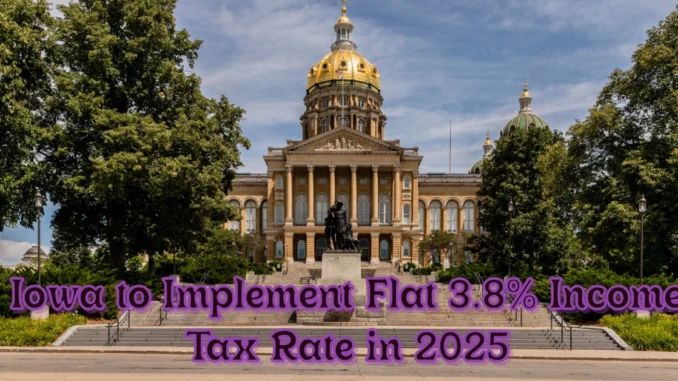
Iowa has implemented a major change in its income tax policy, along with other significant legislative updates for 2025. Here’s what you need to know about the new tax rates, Medicaid coverage, and vehicle registration fees.
Table of Contents
Iowa’s Income Tax Reduction to 3.8%
The latest income tax reform, signed into law by Gov. Kim Reynolds in May 2024, has gone into effect. The individual income tax rate has been lowered from 5.7% in 2024 to a flat 3.8% in 2025, making Iowa’s tax rate the sixth-lowest among the 41 states that tax income, according to the Tax Foundation.
This measure builds on a 2022 law that aimed to move Iowa’s income tax to a 3.9% flat rate by 2026, achieving its target ahead of schedule.
Projected Budget Impact
The tax cuts come with significant budgetary implications. The Iowa Revenue Estimating Conference projects that the state will collect $600 million less in revenue this fiscal year compared to last.
Despite this, Republican leaders assert the state has sufficient financial reserves to manage the transition. House Speaker Pat Grassley pointed to mechanisms such as:
- $3.75 billion in the Taxpayer Relief Fund
- $2 billion in the state’s budget surplus
- $961 million in reserve accounts
Grassley emphasized these resources were designed to offset potential shortfalls without jeopardizing vital services.
Criticism from Democrats
Democrats have expressed concerns about using one-time funds to sustain permanent tax cuts. Senate Minority Leader Janice Weiner compared the approach to personal budgeting, warning of risks during economic downturns, like the 2008 financial crisis.
Weiner argued, “If I have to dig into my savings to cover regular expenses, that money won’t be there for emergencies. This approach could put Iowa in a precarious financial position.”
Other Iowa Laws Taking Effect in 2025
In addition to income tax changes, other laws passed in 2024 have gone into effect this year. Here are some highlights:
Montana’s $675 Property Tax Rebate: How Homeowners Can Qualify and Apply
Who’s Exempt? The Complete Guide to FICA Tax and Who Won’t Pay It in 2025
Extended Postpartum Medicaid Coverage
New mothers in Iowa will now receive one year of postpartum Medicaid coverage, an increase from the previous 60-day period. However, fewer families will qualify due to stricter income limits.
The new income cap is 215% of the federal poverty line, compared to the 375% limit under the previous pandemic-related rules.
- Cost Concerns: Republicans highlighted that maintaining the higher income limit would cost the state $6.2 million.
- Impact on Eligibility: The Legislative Services Agency estimates the changes will disqualify 1,300 mothers and 400 babies each month who previously qualified.
Increased Vehicle Registration and Title Fees
Drivers in Iowa will face higher vehicle registration and title fees under House File 674, also signed in May 2024.
Key changes include:
- A $10 increase for new vehicle registrations.
- Higher fees for issuing or replacing certificates of title.
- Additional costs for transferring or titling foreign-registered vehicles.
A portion of these increased fees will be allocated to county general funds, supporting local budgets.
Find Out How You Can Qualify for Up to $2,000 in IRS Tax Credits
IRS Changes in 2025 Could Increase Paychecks and Reduce Taxes
What These Changes Mean for Iowa Residents
Iowa’s new tax laws aim to boost competitiveness and simplify tax filing for residents, but concerns about long-term fiscal sustainability remain. Families and businesses will need to adjust to both the income tax reductions and other cost changes, such as vehicle registration fees and Medicaid eligibility limits.
Stay informed about how these legislative updates might affect your finances and plan accordingly for 2025.
Leave a Reply